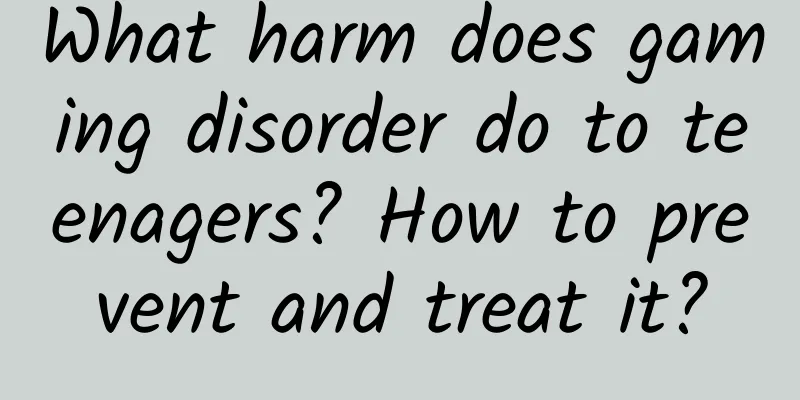What harm does gaming disorder do to teenagers? How to prevent and treat it?

|
Promoting the all-round development of children and adolescents' physical and mental health is a major issue of concern to the Party Central Committee, the people and society. With the rapid development of the economy and society, the growth environment of adolescents is constantly changing. Coupled with the impact of the COVID-19 pandemic, adolescent mental health issues are becoming more prominent. Adolescents are at high risk of gaming disorders, which seriously affects their physical and mental state and academic performance. 1. What is gaming disorder? Answer: On May 25, 2019, the World Health Assembly reviewed and approved the International Classification of Diseases, 11th Revision (hereinafter referred to as ICD-11). Among them, "gaming disorder" was added as a new disease and included in the "disorders caused by addictive behaviors" disease unit. According to the definition of ICD-11, gaming disorder refers to a behavioral pattern of continuous or repeated use of electronic or video games, manifested as uncontrolled gaming behavior, gaming becoming a priority behavior in life, and continuing gaming behavior regardless of adverse consequences for a long time. Gaming disorder patients are mainly males, children and adolescents. 2. What impact does gaming disorder have on teenagers? Answer: Gaming disorder can cause physical problems, mental and behavioral problems, and impair social functions in adolescents. 1. Physical problems: including lack of sleep, circadian rhythm disorders, malnutrition, gastric ulcers, epileptic seizures, etc. In severe cases, prolonged sitting may cause lower limb venous thrombosis, or even pulmonary embolism and sudden death; 2. Mental and behavioral problems: including irritability, anxiety, aggressive words and deeds, depression, guilt, etc.; 3. Impairment of social function: including refusal to go to school and social activities, increased family conflicts, loss of important relationships, and impaired academic achievement and occupational performance. 3. How to prevent and treat gaming disorder at an early stage? Answer: Early prevention and treatment of gaming disorders should adopt comprehensive intervention principles and measures 1. General principles In addition to following the general principles of substance use and addictive behavior disorders, prevention and intervention should be carried out in combination with the high-risk populations for gaming disorder and the characteristics of the disease. We should adhere to prevention as the main approach and carry out evidence-based, ethical, individualized comprehensive intervention measures. 1. Prevention is the priority. Gaming disorder is common among children and adolescents. It takes a certain process for recreational gaming behavior to develop into gaming disorder. Preventive intervention for high-risk groups can significantly reduce the incidence and disease burden of gaming disorder. 2. Evidence-based. All interventions should be based on evidence and should not contradict research or clinical practice evidence. 3. Comply with ethics. Intervention for gaming disorder should be based on universal medical ethics, respect human rights and patient dignity, and not harm the health and interests of patients. 4. Comprehensive intervention. There is currently no specific intervention for gaming disorder. Since patients often have physical or mental illnesses, they need a combination of psychotherapy, drug therapy and other means to conduct individualized comprehensive intervention. At the same time, gaming disorder is similar to psychoactive substance use disorder and may relapse or become chronic. In the process of comprehensive intervention, coordination and supervision from medical care, schools, families, and society are required. 2. Intervention measures for gaming disorder: It is necessary to establish the following three-level prevention system to eliminate or reduce pathogenic factors and improve mental health levels, which will help reduce the occurrence and recurrence of gaming disorders, promote timely diagnosis and treatment for patients, and reduce harm. 1. Universal prevention. Carry out popular science propaganda on mental health knowledge to the public, widely publicize knowledge related to gaming disorder, improve the mental health level of the whole society, and reduce the factors that cause gaming disorder. 2. Targeted prevention. For high-risk groups such as children and adolescents who are prone to gaming disorders, appropriate psychological intervention measures should be taken at the individual level in terms of emotion regulation, cognitive control, and interpersonal communication; for the families, schools, and social environments in which children and adolescents live, popular science publicity on mental health knowledge and coping skills should be carried out to improve family relationships and parent-child communication skills, and care for the psychological needs of children and adolescents. 3. Early detection and treatment. Improve the ability of children, adolescents, parents and schools to identify gaming disorders at an early stage. For suspected gaming disorder patients, guide patients and their families to seek medical treatment in a timely manner, make a clear diagnosis, and receive reasonable and systematic treatment. Carry out targeted training in the psychiatric (psychological) departments of general hospitals and psychiatric hospitals to enable medical staff to correctly identify, diagnose and treat gaming disorders; do a good job in liaison-consultation and specialist consultation to help non-psychiatrists detect and refer gaming disorder patients in a timely manner. Young people are the future of the country and the hope of the nation. The healthy growth of young people is related to the health of the whole people, social stability and family happiness. Let us work together to "promote children's mental health and jointly protect a better future"! About the Author: Wang Huiqiu, chief physician, professor, master's supervisor, national psychotherapist, director of the Rehabilitation Center of Shenyang Anning Hospital, executive deputy director of Shenyang Mental Psychological Rehabilitation Clinical Medicine Research Center, Head of Shenyang Psychological Counseling Hotline. A high-level talent in Shenyang, he has been engaged in clinical teaching and scientific research in psychiatry for 35 years. He is good at preventing, diagnosing, treating and rehabilitating various mental and psychological disorders with the concept of big rehabilitation and big health. He is especially good at using sand tray game therapy, painting psychological analysis and treatment and other psychotherapy techniques to consult and treat psychological problems such as family marriage and adolescent Internet addiction. He has published five national unified textbooks, including Internal Medicine, Psychological and Mental Nursing, Prevention and Treatment of Common Mental Disorders, Medical and Nursing Practice for Dementia Elderly People, and Practical Mental Health for the Elderly. He has published more than 20 papers in professional journals at home and abroad, and presided over more than 20 national, provincial and municipal scientific research projects such as the National Natural Science Foundation of China. He has won 8 provincial first prizes and 5 awards for the promotion of outstanding scientific research results. He has entered rural communities, schools, troops, government agencies, enterprises, institutions, China Mental Association and other social groups, and published hundreds of popular science lectures and popular science works online, offline, on radio, television, newspapers, magazines, multimedia and other authoritative media platforms such as national, provincial and municipal governments, directly benefiting tens of millions of people. Editorial board member of Chinese Health Psychology; deputy leader of the Psychological Rehabilitation Science Popularization Group of the Chinese Medical Education Association; member of the Psychiatric Psychology Group of the Sleep Professional Committee of the Chinese Medical Association; member of the Mental Rehabilitation Professional Committee of the Psychiatric Physicians Branch of the Chinese Medical Association; member of the Geriatric Mental Health Professional Committee of the Chinese Mental Health Association; standing member of the Psychology Branch of the Chinese Society of Gerontology and Geriatrics; deputy director of the Social Psychology Operations Group of the Chinese Rehabilitation Medicine Association; deputy leader of the Science Popularization Working Group of the Mental Health Rehabilitation Professional Committee of the Chinese Rehabilitation Medicine Association; standing member of the Mental Rehabilitation Branch of the China Disabled Persons' Association; member of the Psychiatry Branch of the Liaoning Medical Association; executive director of the Liaoning Mental Health Association; executive director of the Liaoning Psychological Counselors Association; first deputy chairman of the Youth Mental Health Professional Committee of the Liaoning Psychological Counselors Industry Association; executive vice president of the Mental Psychology Professional Committee of the "Two Sessions" of Liaoning Province; deputy secretary-general of the Community Service Promotion Committee of the China Mental Association; secretary-general of the Family Working Committee of the Liaoning Mental Association; vice chairman of the Shenyang Mental Association, etc. In 2022, he was named an excellent rehabilitation physician by the Chinese Rehabilitation Medicine Association, and in the same year he was awarded the title of Advanced Science Popularization Individual of the Chinese Rehabilitation Medicine Association. In 2023, he was awarded the title of Excellent Science and Technology Worker of the Chinese International Applied Psychology Association (2018-2023). |
<<: Approaching adolescent depression: Why do we often ignore children’s suffering?
Recommend
Protect your bones! ——Scientific exercise delays osteoporosis
Do you often feel back pain, or even fractures wi...
World Mental Health Day | How many of these common rumors about mental illness do you believe?
Are mental illnesses just pretentiousness? Are pe...
Why is puff high in calories? What to do if puff cracks
When people are in a bad mood, they have differen...
What to do if the umbilical cord is wrapped around the neck during pregnancy? Observing fetal movement is the most important
Many pregnant women will encounter the phenomenon...
What causes back pain in women?
Body pain is very common in normal times. Take wo...
Why is my vulva itchy and painful?
Vulvar itching accompanied by stinging is likely ...
How to take care of the baby after induced labor in summer?
Everyone knows that confinement is the period of ...
Rapid hemostasis of ovulation bleeding
Ovulation bleeding is not a normal phenomenon. If...
What is vaginal discharge?
Normally, women have vaginal discharge when they ...
Normal performance of pregnant women in the 9th week of pregnancy
Some people really can't bear the reaction of...
Can I get pregnant if I have sex right after my period?
Some women start having sex soon after their mens...
What can I eat to nourish my ovaries?
A woman's ovaries are mainly used to release ...
How long does it take to remove the stitches after episiotomy?
If the mother chooses to give birth naturally, sh...
How long after giving birth can I fill my teeth? Grasp the time well
Because mothers consume too much energy during ch...
What happens if you have diarrhea after eating Moringa seeds? What to do if you have diarrhea after eating Moringa seeds
With the popularity of moringa seeds, more and mo...









